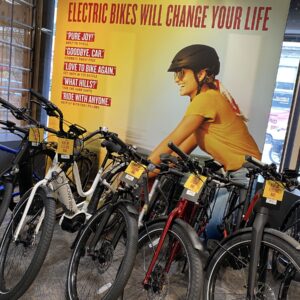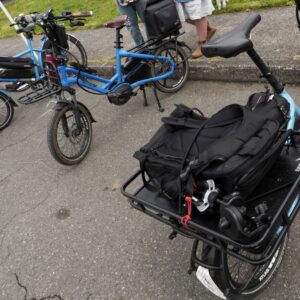Here (one day later than usual — happy holiday) are the bike links from around the world that caught our eyes this week:
Oops: Six mountain bikers were hospitalized in Norway Friday after mistaking a bottle of detergent for a new energy drink.
Legalized distraction: A Los Angeles sheriff’s deputy who killed a tech executive because he veered into a bike lane while typing on his mobile digital computer won’t face criminal charges because California law exempts emergency workers from the state’s anti-texting law.
Electric mountain bikes: They’re on the way.
Car privilege: Lots of people who drive handle their cars responsibly, and lots of people who are white handle their race responsibly, writes a white guy about how biking helped him understand the idea of privilege.
Downzoning Eastmoreland: In a few Portland neighborhoods (including the mayor’s own, which isn’t far from a new light rail stop), the city is “plotting something unthinkable in the 1990s and 2000s — reducing density.”
A life lost: Sher Kung, who was killed while biking in Seattle on Friday, one week before a protected bike lane would have eliminated turning conflicts on the street where she died, was a 31-year-old lawyer on the ACLU legal team that successfully challenged “Don’t Ask, Don’t Tell.”
Carmaker bike share: General Motors will be the first automaker with its own bike share system on its corporate campus in Warren, Michigan.
Cargo savings: Dutch shipping giant DHL has cut 430,000 Europs annually from its labor and fuel costs by replacing 10 percent of its vans with Bullitt cargo e-bikes.
Advertisement
Bike share matures: Mobility Labe has a Q&A with two founders of the new North American Bikeshare Association to talk about this new industry group.
Road rash armor: New carbon-fiber-reinforced athletic clothing is designed to prevent road rash if you take a spill.
Downsizing Ikea: “Paradoxic though it may seem, building an Ikea in an area it’s tough to drive to actually increases the number of visitors,” marvels Gizmodo about Ikea’s new small-parking-lot pilot store in the middle of Hamburg, Germany. One of their key offerings: cargo bike rental.
Raised bikeway: San Francisco is getting its first grade-separated bike lane next year. Portland has these on Southwest Moody and Northeast Cully south of Killingsworth.
Robocar safety: “Should a driverless car protect its occupants, even if it puts non-passengers at risk?” Self-driving cars complicate Vision Zero but make it more important.
Living by sharing: Willamette Week’s Aaron Mesh rode a bicycle for the first time in 18 years as part of an experiment living for a week using peer-to-peer sharing services: Airbnb, Uber, Spinlister, TaskRabbit, Getaround.
And in your video of the week, the BBC for some reason decided to ask a bunch of bike polo players what they thought of various electronic bike gadgets. They gave a good review to exactly one:
If you come across a noteworthy bicycle story, send it in via email, Tweet @bikeportland, or whatever else and we’ll consider adding it to next Monday’s roundup.








Thanks for reading.
BikePortland has served this community with independent community journalism since 2005. We rely on subscriptions from readers like you to survive. Your financial support is vital in keeping this valuable resource alive and well.
Please subscribe today to strengthen and expand our work.
From the downzoning piece:
“of folks working on the East Portland Action Plan, who complain the area got too much multifamily dumped onto it”
Grrrrr.
Multifamily residences are homes, not garbage that is dumped into a neighborhood.
They’re also not desirable for the whole city.
And they need to be properly built in neighborhoods that have sufficient infrastructure and services to be able to handle them.
Dumping them mainly in East Portland, where there is already a well known lack of parks, bike infrastructure, grocery stores, transit, etc., might not be the best way for “smart growth” in Portland.
Or they could build proper sidewalks in East Portland.
In regards to Eastmoreland, that is an entirely different issue… its only not desirable there because “undesirable” people live in apartments.
“They’re also not desirable for the whole city.”
you forgot to add, “in your opinion”.
i would rather blame the city for it’s broken infrastructure promises, pathetic social equity record, and it’s cozy and enabling relationship with developers than the people who live in multi-family housing.
Just as your first statement is your opinion. I don’t think I have to throw a stone very far in this town to hit a citizen who is less than thrilled with some of the changes we’re seeing to attain “density”.
Part of the reason people have a negative view of density is they’re associating the word with huge new houses being up on vacant lots or where a smaller house was torn down. That might be increasing the built density, but it’s not increasing the population density, and it’s making neighborhoods less affordable.
Builders say they’re doing that because it’s what the “market wants,” but they’re really doing it because it brings the highest profit margin.
I was talking more about the single house lots that are being torn down for 2-4 skinny houses. Around my area at least it has been rare for demolitions to be a one for one replacement. Thus density is increasing in an area that the city already admits has insufficient access to transit and shopping.
I get pushing more density in close in, walkable neighborhoods or right on MAX lines. It’s the rest of our neighborhoods where I (and many others) are not so sure that this type of “density” will look like, or if it will work very well.
“…And they need to be properly built in neighborhoods that have sufficient infrastructure and services to be able to handle them. …” davemess
This to me, seems a critically important part of planning for multifamily housing in whether in new, or older neighborhoods whether introduced into new, or older neighborhoods.
It’s always important to question whether in their planning for such development, city officials and planners have sufficiently met the various needs for the increase in number of people anticipated to be moving in. Increased motor vehicle related congestion is just one of the consequences that could arise if sufficient planning for higher density isn’t done.
Siting multifamily housing near light rail and street car does make sense, as does considering what percent of the designated areas residents may be interested in meeting more of their travel needs by walking or biking, if the infrastructure for those modes of travel were well provided.
If they’re all “dumped” in one neighborhood without regard to setting, services, or infrastructure, they turn into the PJ’s. Just because you can warehouse poor people in it doesn’t make it a “home” or a smart/sustainable development.
The Eastmoreland neighborhood is full of historic houses and architecturally significant houses. The development which is prompting Eastmoreland’s reaction is the construction of massive McMansions not multi-family units. The developers remove historic structures to bulld McMansions to capitalize on the charm of the neighborhood while diminishing it.
I bet that is true; Eastmoreland is a wealthy enclave for a reason and newer denser housing probably decreases the charm. Nonetheless, I don’t view historic significance or charm as the highest values for the city as a whole. Making efficient use of giant transit investments and decreasing our carbon footprint seem like higher priorities. The western bit of Eastmoreland right by the brand-new MAX stop would be a pretty good place for multi-family development rather than almost-suburban R7.
Whenever I read about down-zoning eastmoreland, it is inferred that the Mayor is behind it, but there is never any evidence or discussion of it. I would believe that he is behind it, he has completely disappointed me as a mayor, but I love to see this explored a bit more. Whether Hales is involved or not, it seems like a terrible mistake to down-zone along a MAX line. Denser developments could take advantage of the quiet, historic neighborhoods for jogging, walking, cycling, the parks can accommodate more users, and the low-density SFR neighborhoods could get some amenities they could walk to, saving car trips! I could see preserving some parts of that neighborhood, but increased density along light rail should be automatic!
The neighborhood association is very active and they are behind it. The Mayor is responding to the clamor of an organized campaign. Saying that there are inferences that the mayor is behind the down zoning is like Fox pundits saying “Some people say…” as they launch talking points. I know this blog tries to deal with facts, but there are inferences that some posters want to spread rumors to validate their preconceived notions.
“Very active” is one way of putting it…. http://www.oregonlive.com/portland/index.ssf/2014/06/se_neighborhood_buys_a_drone_p.html
Are you inferring that it is wrong for a home owner to video document illegal, unauthorized or dangerous behavior, using legal means? I see (and support) cyclists using Go Pro for just those reasons.
Well actually using a drone for surveillance purposes without a license is not legal according to the FAA. http://www.oregonlive.com/portland/index.ssf/2014/06/se_portland_neighbors_drone_sp.html . And regardless of the legality, it does seem beyond the pale of normal NIMBYism, and like a potential violation of uninvolved neighbors’ privacy to me.
I think he’s implying it, not inferring it.
I’m impressed you actually had high enough expectations of Hales to be let down!
In some regards your proposal makes sense because taller structures would block RR noise, but there is a golf course (PUBLIC) between Eastmorland and the noise source. FWIW the nature of development in Eastmoreland is not multi-family, but big single family which result in negligible increase in Portland’s coveted density.
If that is the case, the downsizing will do nothing to reverse this trend. You can tear out a small bungalow and build a McMansion in any neighborhood in this city. The downzoning will only affect multi-family construction.
RIP Sher Kung. 🙁
Crazy to me that a journalist of an “alternative weekly” in Portland, OR hasn’t ridden a bike in 18 years!
Why?
I personally commuted to work for 9 years without using a car, bike or public transit, by walking.
Does one give up their “alternative” status by not biking everywhere?
you talked about commuting, and then upleveled it to “everywhere.” These are two different things. Sure you can commute without biking no problem, but I think davemess was surprised that the reporter had not met some friends somewhere by biking, or biked to a restaurant, or biked up Tabor to watch the sunset… that type of stuff.
I was thinking more in line with “crazy that a WW reporter hasn’t done the WNBR”.
Guess what, as cyclists we are actually in the minority and it is would actually be more the norm to wonder why someone would ride a bike up Tabor. If your only measure of a person is how often they ride a bike then aren’t you just as much a zealot as those who stick to any other single issue to measure others?
I don’t think it’s weird that he doesn’t ride a bike. I know lots of people who don’t ride bikes. I think someone who hasn’t ridden a bike in 18 years doesn’t OWN a bike. And then I think, what kind of weirdo doesn’t own a bike?
Cyclists are not the minority in the “Portland alternative newspaper journalist” segment. They are the majority.
We are in the commuting minority. I think it would be pretty close as to whether a majority of people in this city have at least ridden a bike once in the last 18 years.
It always comes back to how you define a “cyclist”.
If Ikea were taking bicyclists seriously, I would not have expected them to install bike parking that tacos front wheels. They do design; they can do better!
I would have expected something more like the parking at the New Seasons on Williams. Staples with two points of contact, and staples with two points of contact for tandems/trailers/cargo bikes/tricycles, etc.
And if they’re doing walking-friendly stores, hopefully they’re including ped parking (aka benches)!
Bonus points if they manage to include getting TO the bike parking from the street in their design.
Does anyone know of a good way to roll up to and away from the Williams New Seasons parking?
Hey David… In a few months this will all change, but here’s what I think is the best way to roll into and away from the parking at New Seasons Williams:
— Ride all the way to the Fremont intersection (north border of the store). Then roll up onto the sidewalk on the SE corner of the intersection and walk or ride in the crosswalk to the bike parking.
— Then when you leave, walk or ride east in that same crosswalk and get into the northbound bike lane.
Luckily our Ikea doesn’t have the wheel killer racks. And there’s room for 16 bikes or so locked up to the ribbons under cover out there by the airport. Another dozen or so on the ribbon racks exposed to the elements. Possibly the most underutilized bike parking in Portland.
I just want a nice way to bike to Ikea from Airport Way…
I-205 MUP -> NE Alderwood Rd -> NE Mt St Helens Ave -> Ikea?
(Granted, Airport Way sucks for bikes.)
You can go behind Sports Authority (and all those other stores) for a low-traffic alternative to Cascade Pkwy. Thing is the traffic that IS back there will not be looking for bikes, so you must still be hyper vigilant. Truck drivers may be looking at loading docks behind them more than the view out their windshields, even when pulling forward.
Unfortunately one still has to deal with the double-lane right form Mt. Hood Ave. to Airport Way. Sure wish they’d get rid of the leftmost right turn lane, turn that into a bike lane. I often ride sidewalk north on Mt. Hood Ave.
P.S. Rather than call it a “much smaller parking lot” as they did in the article, I’m inclined to call it a smaller car parking lot, and a larger bike parking lot.
Electric MTB.
I like the idea when we have places like Sandy Ridge, a pretty boring road climb then a steep downhill. Power isn’t going to make going downhill any faster, but could make the climb quite a bit more pleasant.
In flatter, or more rolling terrain, maybe not.
Motorized bicycles should not be allowed on non-motorized trails, ever, for any reason.
Just, no.
I agree they should never be allowed on non-motorized trails. Ever. They should not be called electric mountain bikes either. They are MOTORCYCLES – two wheeled vehicles with a motor that is not human powered.
I like “zero-point emission motorcycles”.
See this is the problem I see with a lot of designed trails in this area. They are so focused on the downhill (which is a lot of fun), that they don’t have any fun or challenge on the uphill (which is really half the sport). I get that DH and all mountain bikers don’t want to do a lot of technical climbing, but I get incredibly bored and frustrated that we’re often only given paved or gravel roads to ride up.
Electric MTB’s could be helpful to people with some degree of disability that would like, but otherwise could not experience single track off road bike trail.
Bob, out of curiosity, why do you not like to use the term “mountain bike”?
No aversion to the phrase, but it was easier, and I think better here, to just copy and paste the phase ‘Electric MTB’ that Psyfalcon used in his comment.
I wonder if those potential people who are too disabled to ride a normal mountain bike but could benefit from using an easier e-bike (motorcycle) should be allowed to ride the off-limits-to-bicycles single track trails in Forest Park? You know, because they’re disabled and potentially couldn’t enjoy it otherwise by walking, since e-mountain biking, (motorcycling) is much easier on the body?
I like where this is headed.
Valid point that could be a good idea for people with a disability for whom use of a bike could substitute for an inability to walk in order to experience trail in natural areas.
Some years back, looking into uses people were making of bikes they had equipped with electric motors, I read a number of stories people had written, about how their ebikes enabled them to return to back road riding.
I don’t see ebikes enabling people with disabilities to do rigorous types of mountain biking, but such bikes may enable people with some types of disabilities, to access and enjoy at least some milder terrain trail without it being paved, in natural areas.
You must race Enduro.
I remember one time I grabbed free thin tube with sprayer. I thought it was for mouth fresher but it was really for hand sanizter. Good thing I asked the booth attendant. Print on the tube was very small.
amazing that BP.O missed this :
The following is a brief overview of the reported fatal traffic crashes all of which were investigated by Oregon State Police (OSP) troopers:
* On August 30 at approximately 2:56 p.m., a 74-year old bicyclist from St. Helens was killed when a distracted driver struck him from behind as he rode westbound on Highway 30 west of Rainier in Columbia County. The driver fled the scene and was arrested by OSP about five miles west of the crash scene for Manslaughter in the First Degree, Felony Hit & Run, and on a misdemeanor warrant.
http://www.flashalert.net/news.html?id=1002
the stuff of nightmares!
We didn’t miss it Tom. Just haven’t covered it yet. Thanks.
He was a 2 time cancer survivor who did 50 mile rides, three times a week.
Hit & run by a texter.
news ?
OK, so it wasn’t illegal for the officer to be texting, but doesn’t he still have an obligation not to run over someone?
It’s also in the linked article, but here’s a link to the LA County DA’s charge evaluation worksheet:
http://bikinginla.com/wp-content/uploads/2014/08/JSID_wood.pdf
In the course of their duties, the law allows police while driving, to use their duty computer and so on, but I would think the law still does require them to do so in a way that a reasonably careful person would do. Check out ‘Elements of Vehicular Manslaughter’, page 5 of the pdf.
The law allows police to use their computer in a way that a reasonably careful person would.
Inadvertently allowing the vehicle to leave the main lane of the road for the adjacent bike lane, because the person driving didn’t sufficiently check out the road ahead to know there was both a the person riding on the bike lane, isn’t something it seems that a reasonable careful person would do. Same as well for not taking note of the fact that the road presented a transition from straight to a slight curve.
Link to another story with a quote from Eric Bruins, planning and policy director for the Los Angeles County Bicycle Coalition, reasoning that California law allowing police to do something while driving, does not allow them to do so, unsafely:
http://www.dailynews.com/general-news/20140827/in-calabasas-death-of-cyclist-milton-olin-no-charges-against-typing-deputy
“…“Just because the law allows someone to do something while driving doesn’t mean they are allowed to do something unsafely while driving,” Bruins said. “Hitting someone from behind is very clear evidence that whatever was going on in that car was not safe and should have been considered negligent.” …” Eric Bruins
In the stories is also some explanation of the standards of proof that have to be met to get a conviction.
Yeah, I read a few Facebook comments by people who said that he was allowed to text, so he wasn’t in the wrong. That’s just nonsense. He’s allowed to breathe, but he still needs to avoid hitting people.
And, FWIW (it may be entirely unrelated to this particular crash), records indicated that he sent or received 9 texts between him & his wife just a couple of minutes beforehand. Don’t suppose that would be distracting AT ALL.
an exception for police ought to be limited to duty-related texting
“Under the current zoning rules, Eastmoreland as we know it could easily be gone in five years,” says Robert McCulloch, president of the Eastmoreland Neighborhood Association. “Basically, a vast majority of the homes will be eligible for demolition.”
Baloney. The vast majority of homes in Eastmoreland are too expensive to attract a developer. The Eastmoreland neighborhood association is totally NIMBY.
Yes, my perception has been that East Moreland is a neighborhood that sees a good bit less turnover than most Portland neighborhoods.
If it means that much to most of the community, can’t individual homeowners also determine who they sell to (i.e. not selling to developers)?
The model being protested by the Neighborhood association is where developer buys a 500K or 600K house demolishes it and builds two 900K houses on the lot. The new homes look line typical subdivision McMansions. The houses are not too expensive to demolish.
Why is that a problem?
Although it is not important to some on this blog, the houses being removed have both historic and architectural significance. The new homes have neither. They capitalize on the character that the history and unique architecture impart on the neighborhood while they cannibalize the features that make the neighborhood special.
If they’re that special, why not go for a historical preservation approach?
I don’t have all the answers, but I know that the model of development that is impacting the neighborhood is unwelcome for reasons that are pretty obvious if you are familiar with the area. The same thing is happening in the Reedway neighborhood, where “atomic ranch” homes built in the 60s are being supplanted with big, towering, multi story, single family, boxes that are entirely out of character with a uniquely themed area.
people probably didn’t like the atomic ranch homes when they were built either… and the people before that didn’t like their view of rolling hills disturbed by the houses built at the turn of the century…
keep off my lawn!
if people are buying these new houses then there’s a market and good luck stopping the market from creating construction…
stop it if it’s not healthy for the region, not just because you don’t like how it looks…
Oh, I know, I live in a 1922 Bungalow that I have carefully remodeled to match the original style of the time. I just don’t think I can tell my neighbors what to do with their lots, provided they follow all of the city codes. One of the great things about living in the city is that we don’t have to deal with HOAs and their outdated ideas of what is “appropriate” for the neighborhood. As a native Portlander, I hold somewhat libertarian environmentalist ideals. I don’t think the people blocking development in the city share these ideals.